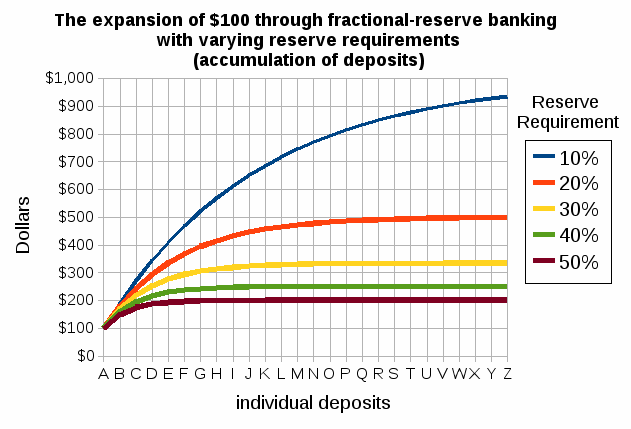Re: SB: Unenforceable But Why Not Non-collectable?
As they say, a picture is worth more than 1000 words!
The graph below shows how $100 can 'expand' into $1000 when the reserve requirement is just 10%. In reality, it could well be much lower than that, around 3%. In layman's terms, for every $100 a bank has in deposits, they can 'lend' $1000 (assuming a 10% reserve, much more at lower levels). The remaining $900 are whipped up out of thin air, all the bank does is make an entry on a database saying they are lending you a certain amount, they are not actually giving you any money as such.

Another example could be a hall of mirrors, where you have mirrors on the walls, ceiling, etc. and they all reflect each other and each other's reflections. If you were to place a £1 coin on a table in the middle of such a hall, you'd see it turn into a lot of £1 coins as it gets reflected time and again on the mirrors, so you may think there's £1000 where there's just £1!

The fractional reserve system works on the assumption that those who have made deposits, will not all wish to withdraw all their money at the same time, when that happens, you get a run on a bank, as was the case with Northern Rock in 2007.
The banks apply interest and other charges to the money they 'lend', this is real money that goes back to their coffers.
Lending money is just ONE type of business activity banks engage in, speculating in stocks, futures, commodities and a variety of other financial instruments is a significant source of income, in fact, for some banks, it is their main source of income.
Originally posted by PlanB
View Post
The graph below shows how $100 can 'expand' into $1000 when the reserve requirement is just 10%. In reality, it could well be much lower than that, around 3%. In layman's terms, for every $100 a bank has in deposits, they can 'lend' $1000 (assuming a 10% reserve, much more at lower levels). The remaining $900 are whipped up out of thin air, all the bank does is make an entry on a database saying they are lending you a certain amount, they are not actually giving you any money as such.


Another example could be a hall of mirrors, where you have mirrors on the walls, ceiling, etc. and they all reflect each other and each other's reflections. If you were to place a £1 coin on a table in the middle of such a hall, you'd see it turn into a lot of £1 coins as it gets reflected time and again on the mirrors, so you may think there's £1000 where there's just £1!


The fractional reserve system works on the assumption that those who have made deposits, will not all wish to withdraw all their money at the same time, when that happens, you get a run on a bank, as was the case with Northern Rock in 2007.

The banks apply interest and other charges to the money they 'lend', this is real money that goes back to their coffers.
Lending money is just ONE type of business activity banks engage in, speculating in stocks, futures, commodities and a variety of other financial instruments is a significant source of income, in fact, for some banks, it is their main source of income.






Comment